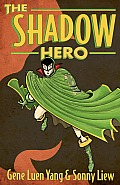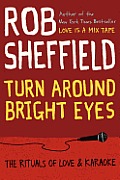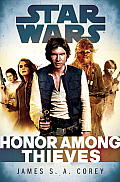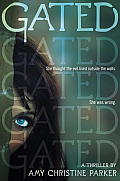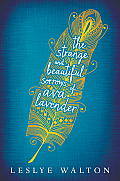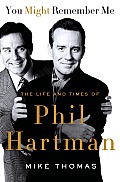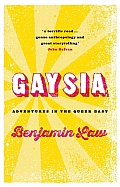Link to this review in the form of a comic strip by geneambaum tagged superhero • historical fiction • graphic novel
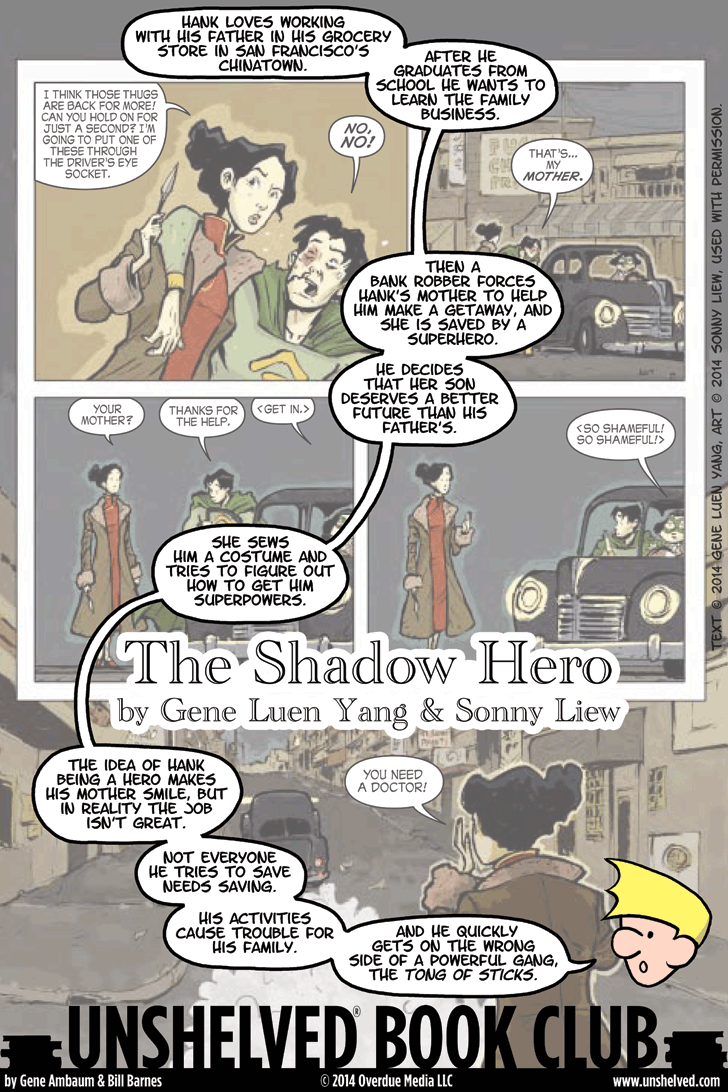
Click for the full-sized comic
@bookblurb Hank wants to be a grocer in Chinatown like his father, but his mother wants him to be a superhero.
Link to this review by emilyreads tagged biography
In Love Is a Mix Tape, Rob Sheffield chronicled his love affair with his first wife, which was cut short by her cancer and death. In this follow-up, he picks up where he left off, working through grief and finding new love through the magic of karaoke. Sheffield not only discourses on the history and rituals of karaoke, but also the blessings of grown-up love and marriage, the perplexingly male-only makeup of Rush’s fan base, and the three phases of Rod Stewart through which all men must pass.
Why I picked it up: I came across the galley at BEA last year and couldn’t resist the title. Because every now and then I fall apart.
Why I finished it: For a relatively short book (288 pages), it’s surprisingly dense. Every chapter equally fascinating, often moving, and with just enough snark to elicit a chuckle. “That’s right: my dad’s Boston accent could make a man wince even when my dad was speaking Latin.”
It’s perfect for: Your rockstar-wannabe friends will love it. Give it as a gift with a subscription to Rolling Stone (Sheffield’s employer), or, if you’re feeling generous, a weeklong trip to Rock ‘n’ Roll Fantasy Camp (described in Chapter Thirteen).
@bookblurb Rob Sheffield gets through grief and finds new love through the magic of karaoke.
Link to this review by geneambaum tagged science fiction
Just after the Battle of Yavin, in which the first Death Star was destroyed, the Rebel Alliance receives a retrieval request from a spy, Scarlet Hark, working on an Imperial planet. Han Solo and Chewbacca are sent in to bring her out. They manage to locate her, but things quickly get complicated. She needs help breaking into a well-guarded Imperial data center and then tracking a criminal who has information that may be the key to defeating the Empire. At the same time, a former smuggler turned bounty hunter is on Han’s trail, desperate to earn the reward for returning Han to Jabba the Hutt.
Why I picked it up: I loved Corey’s hard science fiction novel, Leviathan Wakes, and I’m working up to reading its long sequels. This is shorter, Han Solo was front and center on the cover, and I wanted to read something light. Slam dunk.
Why I finished it: There are bits of humor throughout. After tailing the criminal to a meeting of rebels and their financiers, Han is walking around a party when a Bothan hands him an empty glass. It takes Han a moment to figure out that the Bothan thought he was a waiter. The unseen narrator is pretty funny, too. When Han and Chewbacca head to retrieve Scarlet Hark from the planet Cioran, it’s not quite the center of the Empire: “A small blue world nestled in a swarm of Imperial ships and independent stations. Cioran, bureaucratic heart of the Empire. Or if not heart, kidney. Maybe small bowel.”
It’s perfect for: Liz. She’s got a lot of compassion for animals, so she’d like it when Han stops someone from shooting a large, docile alien just because it looks scary. “If everyone got to kill anything that looked big and scary, Chewie would never be able to leave the ship.”
@bookblurb Just after the Battle of Yavin, Han and Chewie go to the heart of the Empire to retrieve a rebel spy.
Link to this review by snow tagged coming of age
Lyla and her family live in the Community, a place of nature, friendship, and family, a place where they will be able to live through the coming end of the world. Their leader, Pioneer, is helping them prepare to survive, though Lyla isn’t sure she’ll be able to do things like kill strangers, even to protect her family. When she meets a boy, Cody, from the outside, Lyla begins to question what she’s been told about all of them being evil. If Pioneer is wrong about that, what else is he wrong about?
Why I picked it up: I’ve always been intrigued by stories about characters living in closed societies.
Why I finished it: I was surprised that it was not as apocalyptic or dystopic as I thought it was going to be. Parker grounds her tale in the real world, which leads to a fascinating contrast between Lyla’s life in the Community and Cody’s on the outside. There were many positives about life in the Community — friendship, communion with nature, safety — but the way that contrasted with the lack of freedom and with the constant threat of the end of the world kept me engaged.
Readalikes: One of my favorite books about characters closed off from the rest of the world is Margaret Peterson Haddix’s Running Out of Time, about a girl who thinks she lives in a small village in the 1800s. When an epidemic strikes her town, her mother sends her into the outside world of the 20th century to get help. There’s also The Compound by S.A. Bodeen. The protagonist is a young man whose father is keeping a dark secret from their family about why they are really hiding out in a bomb shelter after a nuclear holocaust.
@bookblurb After she meets a boy, Lyla begins to question the Community’s belief that outsiders are evil.
Link to this review by diane tagged paranormal • coming of age
Ava Lavender was born with wings. Not tiny unobtrusive ones, but large beautifully elegant wings covered with soft, speckled feathers. For sixteen years she has led an idyllic, sheltered life in the house on Pinnacle Lane in Seattle with her quietly withdrawn mother, her twin brother, and her grandmother. Part family history, part memoir, part fairy tale, Ava tells the story of her grandmother and mother. Ava longs to live as a normal teenager and begins to venture out into the wider world, but makes unfortunate, dangerous choices that threaten her survival.
Why I picked it up: Because of the “local author” sticker on the cover. When I realized it was her debut novel and that it was set in Seattle, where I live, I was sold.
Why I finished it: From the first page, I was hooked. The prologue, written by Ava, tells the story of her illegitimate birth and how she set out to discover her family history. I fell in love with her strange family, particularly Ava, her grandmother, Emilianne, and her grandmother’s odd siblings — Margeaux, who killed herself after giving birth to an illegitimate child fathered by Emilianne’s boyfriend, Rene who was murdered for loving a married man, and Pierette who transformed herself into a canary. These tragedies led Emilianne to marry for convenience rather than love. Ava’s mother, Vivianne was also unlucky in love, and bore illegitimate twins (Ava and her brother).
Walton’s writing is beautiful and descriptive throughout. There were moments when I just stopped and reread a sentence because it was so wonderful. I laughed, I cried, and sometimes I held my breath.
Readalikes: Chocolat by Joanne Harris, which is also sweet, subtle, and has just a touch of the supernatural.
@bookblurb Ava, who has large, elegant wings, longs for a normal life.
Link to this review by flemtastic tagged biography
Many readers will know Phil Hartman because of his work on Saturday Night Live (1986-1994). Fewer know that he voiced several characters on The Simpsons and worked on Pee Wee’s Playhouse as Captain Carl. He was a master of impressions, imitating over seventy celebrities in his time on SNL, including President Bill Clinton. Offscreen he was a quiet, regular guy, who enjoyed sailing his boat to Catalina Island every weekend. Somewhat overshadowed by breakout characters pioneered by Dana Carvey (Church Lady) and Jon Lovitz (The Pathological Liar), Hartman was widely acknowledged as the glue that held the show together.
Why I picked it up: I am a big SNL fan. I always appreciated the oily suaveness that Hartman brought to each character, and the complete passion with which he played them. Even when he played absolutely ludicrous characters complete straight, he brought serious laughs to every scene.
Why I finished it: I learned that Phil was not someone who felt like he always had to be on stage. When the cameras were off, he was restrained and shy. He was also a multi-faceted artist and graphic designer. (He did the iconic cover of History: America’s Greatest Hits for the band America.) For fans of SNL, there are nuggets about funny scenes that Phil was in. My favorite was “The Anal-Retentive Chef,” where the chef on a TV cooking show runs out of airtime before he gets to cook because he is gift-wrapping the refuse into a tidy package to put in the trash. Lorne Michaels, the creator and producer of SNL, said that Hartman might be the best actor in SNL’s history: “Phil has done more work that’s touched greatness than probably anybody else who’s ever been here.”
Thomas also goes into detail about the actions of Hartman’s wife on the night she killed him and then herself without being maudlin. Depression medication, in concert with alcohol and a bit of cocaine, led Brynn to shoot Phil while he slept before turning the gun on herself.
It’s perfect for: My friend Caleb, who will appreciate details about Phil’s quasi-religious appreciation of surfing and his relentless spiritual questing. Caleb shares the same restlessness about finding his place in the universe.
@bookblurb A biography of comedian, voice actor, and Saturday Night Live frontman Phil Hartman.
Link to this review by geneambaum tagged picture book • nonfiction
Odd facts about animals we’re all somewhat familiar with, illustrated in funny ways by Pete Oswald.
Why I picked it up: The insane looking squirrel on the back cover, with its overstuffed cheeks, is even funnier than the hippo wearing water wings on the front.
Why I finished it: I’ve seen a lot of books that are just random collections of facts, but this one does a good job of stringing them together. It moves from the hippo not really being able to swim (they’re too dense to float) to sea turtles, which can swim thirty-five miles-per-hour, to jellyfish. Then it tells about the bioluminescence that some jellyfish produce, and how it can scare off predators. (It’s a bonus for me that the very freaked-out looking shark resembles Jabberjaw.)
It’s perfect for: One of my cousin’s kids who live up on Whidbey Island. We’re always meeting at the zoo in Seattle, so I think I’ll make it a challenge. The book says that zebras are attracted to things that are black-and-white striped. Whoever can get the zebra to walk toward him or her by wearing the “hottest” outfit gets the book.
@bookblurb A fun, illustrated book of odd facts about animals we think we already know.
Link to this review by darcy tagged coffee table book
A sarcastic catalog of the world’s most poorly designed and short-lived cars.
Why I picked it up: I was looking for stock car racing books for my son. While in the stacks the word “crap” jumped out at me from the spine. I had to take a look.
Why I finished it: Some cars didn’t last long on the market and were destined to be design failures. Among the cars listed is the Yugo, long the butt of jokes. Porter’s description of each includes a one-line insult. Some of my favorites were for the Sterling 825/827 (“If this car was trying any harder to be British, it’d be Madonna”), the Ferrari 400 (“If this car was an actual horse, you’d shoot it”), and the Ford Mustang II (“If this car was any more crap, it’d have flies buzzing around it”).
It’s perfect for: Car enthusiasts like Merle, who calls the library where I work at least once a month. He’s been having us fax him the pages from the Standard Catalog of American Cars for ages because he’s too cheap to buy a copy for himself. We’re currently into the D section, at DeSoto. I bet he’d appreciate the details on these crappy cars, along with both interior and exterior photos and their rank from bad to worse.
@bookblurb A sarcastic guide to the world’s worst cars.
Link to this review by flemtastic tagged nonfiction
Benjamin Law, a gay Australian, travels around Asia to see how gays are seen and treated in different countries. Christian and Muslim fundamentalists in Malaysia sponsor “cure” programs. Chinese gays find each other on the internet. (Censors apparently don’t care about sexual orientation, only political rebellion.) Japan has many campy gays on television. And then there are more welcoming places like the Indonesian nudist hotel which caters to gay tourists looking for a good time.
Law’s in a committed relationship, but he dutifully takes part in many of the activities he comes across, from going backstage at a Thai ladyboy pageant to investigating Myanmar’s explosion of AIDS/HIV cases. Seven countries are examined in detail by the author, who put himself in some some strange, humorous situations over the course of his research.
Why I picked it up: The title.
Why I finished it: Each country deals with the reality of gay citizens differently. In Japan, they are very open about having gays in the population, but only gays of a certain type are widely acknowledged. Many shows on network television have a gay character (it’s almost a necessity), but each is a campy cliché, usually a feminine, falsetto-voiced cross-dresser. In China, where the culture strongly pushes for marriage, gay men often advertise for a lesbian to marry to quiet their family’s pressure. They even go so far as to move in together for the few days a year when the in-laws visit. In Thailand, the ladyboy pageant can be a life-changer for the winner, and though there has been progress, transgendered Thais are still treated as defective.
It’s perfect for: My friend Patrick, who has been out for decades. He would get a kick out of the inside jokes and stereotypes that Law finds all around the world, but he would especially like it when the good-humored, ever-patient Law endures a pastor’s explanation about how homosexuals can never find happiness or fulfillment in a relationship. (Law says he has both.)
@bookblurb A gay Australian travels around Asia to see how gays are viewed and treated in different countries.
